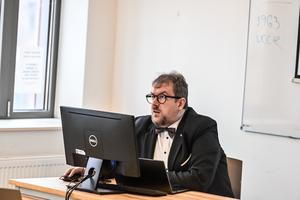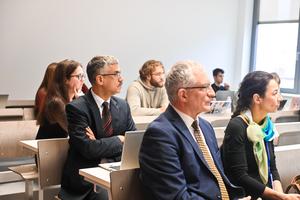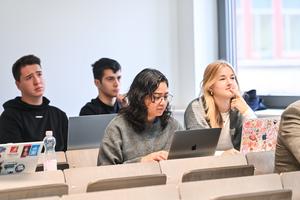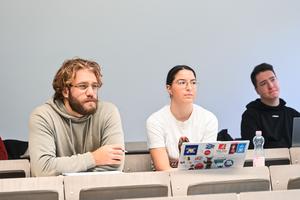In the framework of the Ludovika Scholars Program, Dr Wojciech Federczyk, associate professor at Cardinal Stefan Wyszyński University in Warsaw, visited the Faculty of Public Governance and International Studies. As an expert in public law and public administration, Dr. Federczyk gave a public lecture on the structure of the Polish public administration and current issues in the training of public service professionals, while in a workshop he presented the specifics of Polish public service training.
In the context of the public lecture, the speaker analysed in detail the additional requirements for civil servants and public administrators in the civil sphere, the advantages and perspectives offered by a predictable career model in public administration. In his presentation, he highlighted Polish good practices in creating a modern civil service and service-orientation of public bodies.
The workshop focused on the experiences and perspectives of continuing education systems in civil service, based on the work of the Lech Kaczyński National School of Public Administration (KSAP). Following a welcome address by Dr. Tamás Kaiser, Head of the Department of Governance and Public Policy, the organiser of the event, Dr. Federczyk, former Director of the institution, recalled in his introductory speech that the institution became a key player in Polish civil service training after the regime change in September 1991, as it is currently the only institution in Poland specialising in the education and training of civil servants. The institution, which operates under the direct supervision of the Prime Minister, is not part of Polish higher education, but offers candidates a highly practice-oriented training similar to academic courses. KSAP's training portfolio includes an 18-month scholarship-based intramural programme and a 17-week two-cycle work-based programme. In addition to the academic transfer of knowledge, courses in foreign languages and work placements in national and international institutions play a key role in the varied forms of education - postgraduate, targeted, e-learning.
Dr Federczyk highlighted the importance of learning analytical methods and strategy-oriented leadership skills tailored to individual and group needs, for which the institution provides mentoring and coaching support.
Afterwards, moderated by Dr. Máté Szabó, the speaker answered questions posed by the workshop participants - experts from the Department of Governance and Public Policy, the Institute for Advanced Studies in Public Administration and students of the Doctoral School of Public Administration - on the measurability of the effectiveness of training, the integration of project management skills into training, the target groups of potential students and the usefulness of the diploma obtained. In closing, Dr Wojchiech Federczyk and Dr Máté Szabó highlighted the importance of disseminating good practices and the adaptive translation of innovative solutions into practice.
Text: Ludovika, FPGIS, Department of International Affairs
Photos: Dénes Szilágyi and András Szabó



